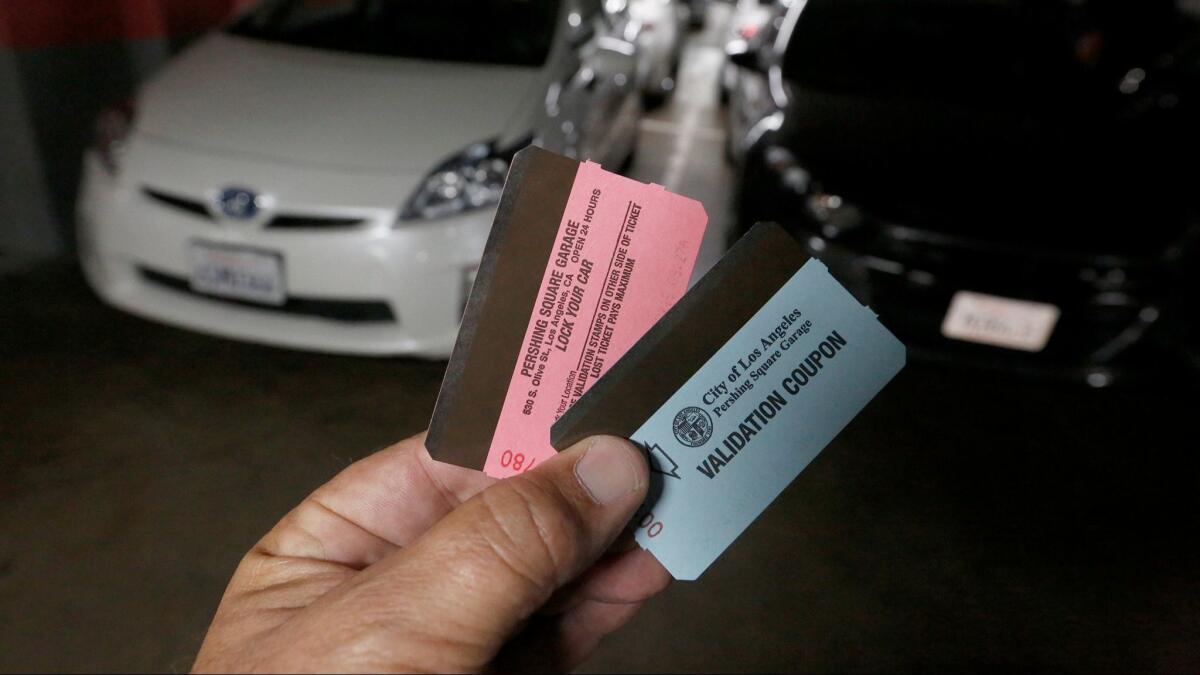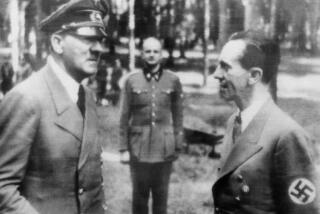Opinion: Here’s an easy way to fight L.A.’s traffic and boost transit ridership — reward commuters who don’t drive

Employer-paid parking is an invitation to drive to work alone.
Policy makers have long been aware that parking subsidies increase traffic. In the early ’90s, a survey of 5,000 commuters and their employers in downtown Los Angeles showed that free parking at work increased the number of drivers by 34%.
In 1992, California enacted legislation requiring that employers who subsidize parking for commuters must also offer them the option to take an equivalent cash allowance instead of the parking subsidy. Called “parking cash out,” the law applies to employers who have 50 or more employees and who rent the parking spaces they provide free or below cost to drivers. When a commuter takes the cash, the employer saves the expense of a parking space.
Parking cash out increases the share of commuters who carpool, ride public transit, walk or bike to work. Studies of employers in Southern California who offer parking cash out found that for every 100 commuters offered the cash option, 13 solo drivers shifted to another travel mode. Of those 13 former solo drivers, nine joined carpools, three began to ride public transit and one began to walk or bike to work. Overall, the share of commuters who drove to work alone fell from 76% before the cash option to 63% afterward.
Because of these shifts, vehicle travel and pollution emissions for commuting fell by 12%. The large shift from solo driving to carpooling shows that parking cash out can work even in places with limited public transit.
Unfortunately, however, most employers have never heard of the cash-out law — and are unaware of their responsibility to comply with it.
California’s legislative analyst estimated that 290,000 employer-paid parking spaces are subject to the cash-out law statewide, but found that most employers do not comply. While enforcement was formerly impossible because the original legislation did not include any penalty for noncompliance, in 2010, California authorized cities, counties and air quality management districts to establish a penalty for firms that fail to comply.
Few have done so.
Santa Monica is the only city in Southern California that now enforces the law. Thirty-three employers in Santa Monica are subject to the law, and, at some of these firms, more than half their employees choose cash rather than take free parking.
The legislative analyst estimated that enforcing the cash-out law would reduce vehicle travel for commuting by between 113 million and 226 million miles per year, lowering carbon dioxide emissions by between 87,000 tons per year and 173,000 tons per year.
Cities can use California’s parking cash-out law as a fair and cost-effective way to reduce traffic congestion, air pollution and greenhouse gas emissions. They only have to establish a penalty for violating an existing state law. This penalty is like a ticket for failing to pay at a parking meter. It isn’t onerous, but it will encourage employers to comply with the law.
Failure to offer parking cash out denies a state-mandated employee benefit to commuters who use alternative means of getting to work. This denial disproportionately harms women, minorities and low-income commuters because they are all less likely to drive to work and therefore more likely to take the cash. Providing non-drivers the same commuting benefit provided to drivers is simple transportation justice.
California’s cash-out law does not prohibit, tax or discourage employer-paid parking. The law simply requires that an employer who offers to pay for parking if a commuter drives to work must also offer to pay the same amount if the commuter doesn’t drive to work.
Commuting subsidies should go to people, not parking.
Donald Shoup is a distinguished research professor of urban planning at UCLA and the author of “Parking Cash Out.”
The California Air Resources Board has published a guide to California’s cash-out law.
Follow the Opinion section on Twitter @latimesopinion or Facebook.
ALSO
Note to Republicans: Drop the crusade against Planned Parenthood
The original mistake that distorted the health insurance system in America
Trump’s Treasury secretary is an Artificial Intelligence denier
More to Read
A cure for the common opinion
Get thought-provoking perspectives with our weekly newsletter.
You may occasionally receive promotional content from the Los Angeles Times.






